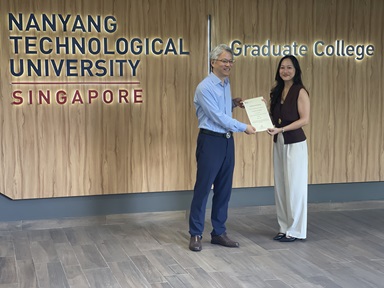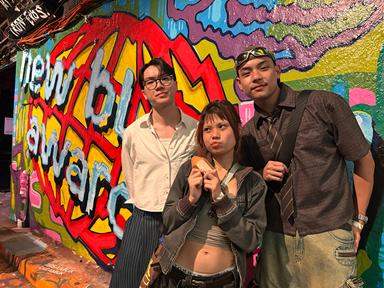MiniMasters™ in General Management: Bridging the Knowledge Gaps in Business
Fresh out of school, Jake Tan, 27, together with ex-classmate Sheryl Sim, 25, and a course senior Ernest Goh, 30, founded Serial Communication, a start-up that offers design and delivery of digital art projects. All three graduated from Nanyang Technological University’s Art, Design & Media with different specialisations, and like most start-ups by young adults, there was a lot of energy and passion at the beginning.
“We were busy scrambling for pitches and when we won projects, we would jump through hoops to fulfill our clients’ briefs,” Jake recalled.
But he soon realised that for a business to grow and be sustainable, he needed more than enthusiasm. He needed a better understanding of how to develop and manage his business from both a top-down and bottom-up approach. The need to bridge this knowledge gap led Jake to explore the NTU MiniMaster™s in General Management programme. Intensive and full of practical instructions, it was a programme that had all the answers for him.

Jake Tan
A Delectable Five-Course Programme
Designed to equip participants with skills necessary to run modern enterprises, the five-course sequence in the General Management programme focuses on key aspects of business strategy –people management, operations, company governance, cultural intelligence, and business negotiation. “The classes in the programme are the most interesting and engaging business ones that I have ever attended and the practical takeaways from each course set the foundation for my entrepreneurship,” said Jake.
Finding a Business Model
The first thing he discovered about his start-up was that he needed a good business model to work on. “Because our business revolves around developing bespoke products that can be accompanied by a suite of services, we need a business model that covers many aspects, and take us into the long haul,” Jake explained.
Throughout the programme, his business model gradually transformed from his initial basic model into a detailed and extensive one. “I consulted with my professors, ran my raw ideas and case studies with them, and continually added and changed my business model until I reached one that fit our needs,” said Jake.
Getting Organised
With a business model in place, the next step was getting the business into shape. “I learnt the importance of differentiating our roles within the company for better efficiency, so now Sheryl oversees the marketing aspect of the business, Ernest takes care of the artistic direction for projects, and I work on business development and strategy,” he added. With everything in place, Jake could see that the business required a project manager to drive and lead each project that they took on so that Sheryl could spend her time sourcing and securing new projects. Plans for a bigger production team are already in the works with business ticking up.
Planning Ahead
Another important skill that Jake learnt is how to do forward planning for the business. “We often hear of start-ups that fizzle out after a few years and we didn’t want to add to that score,” said Jake. Every day after class, he consulted his professors to refine his short-term, mid-term, and long-term business goals. He then spent time writing and adjusting business plans to position the company to reach out to the right clients, and to identify the markets he could target.
Branching Out
Jake has also made plans to diversify his product portfolio to cater to various industries such as commercial entities, government bodies, and educational institutions, among others. He calls these business subsidiaries or “wings” and hopes to create different departments in his company to cater to each “wing”. To realise these objectives one at a time, he has developed 3-year, 5-year, and 10-year business plans. But in the meantime, they are working along a masterplan to build project references, even it means forgoing paychecks, for the opportunity to showcase their work.
Seeing Returns, Winning Awards
“Right after we concluded our sponsorship for National Day Parade where we made two augmented reality (AR) filters for one of the performances, two government ministries approached us for work,” said Jake. Another recently completed project was a collaboration with Lloyd’s Inn, a boutique hotel where they enhanced the hotel’s ambience with art and technology through AR. With the AR effect, the hotel won Singapore Tourism Board’s Outstanding Hotel Experience Award in July. Because of that award, Jake now has hoteliers knocking on his doors to create experiential content. “We are beginning to see conversions on our value proposition activities, and I hope we can start paying ourselves decent wage soon,” he added.
From having no concrete ideas to getting clear directions and practical next steps, Jake says he owes a big thanks to MiniMasters™. “If there’s anything to describe my experience going through the programme, I would say it was life-changing, from a business perspective,” Jake added.
Find out more about our MiniMastersTM courses here.





.tmb-listing.jpg?Culture=en&sfvrsn=14693557_1)

